Regional energy provider gains control over outdated field records
Learn how a regional energy provider improved compliance and implemented a consistent methodology for their records management policy.

CHALLENGE
Identify, sort, and classify valuable records inventory stored across widespread locations and environments for improved compliance with records management policy.
Safety and compliance are critical to national security, especially in the Energy Sector. Maintaining the country's infrastructure means this highly regulated industry is under constant scrutiny. All company records need to be found quickly and easily in case of emergency, pending litigation, or regulatory investigations.
For a regional gas and electric organisation with almost 10 million customers, implementing a functional and widespread records classification project was a point of focus. The sheer volume of records, locations, and environments made realising this goal a considerable challenge. Multiple acquisitions and mergers over its rich hundred-year history resulted in documents and maps stored in various locations, including warehouses, substations, power plants, administrative offices, abandoned buildings, and shipping containers. This lack of control and consistency threatened to jeopardise the safety of confidential information, thus exposing the organisation to considerable risk.
To bring everything into compliance with their current records management program, the provider teamed up with Iron Mountain to review, categorise, and consolidate their diverse records inventory.
SOLUTION
Content Classification Service
The first step was to establish and implement an enterprise-wide records management program for newly created documents. Next, it was necessary to address legacy records inventory stored in various field locations across the region.
"It’s rare to get such partnership and willingness to work as a team. We’ve achieved much together this year and have a great path forward."
PROJECT SPONSOR
Field teams implemented standard procedures, adapting the process as-needed based on site-specific requirements and potential hazards, wearing the appropriate safety gear, attending training, and learning emergency procedures. Each location began with a walk-through, in which project teams met with field personnel to gain buy-in and establish the action plan. After completing the classification, Iron Mountain provided summary metrics and specific details of every record removed from each site.
Every week, Iron Mountain provided a project status report and facilitated a meeting with all team managers. Each team shared their current status and received expectations for the next site. Bringing the teams together ensured consistency across the entire project and kept the lines of communication open. Challenges were discussed and resolved so that the teams would know what to do the next time they encountered the same obstacle. Executive sponsors gathered monthly to monitor performance and review project achievements.
OUTCOME
Working with Iron Mountain, the regional energy provider was able to implement a consistent methodology by bringing outdated records into compliance with current Records Management Policy. The Iron Mountain team consolidated and securely transported widespread records into three central locations, which freed up valuable field real estate. The project included categorising and describing each record, assigning date ranges, and identifying departmental ownership to help employees quickly find specific records.
The flexibility and consistent communication provided by Iron Mountain enabled the regional energy provider to re-prioritize at-risk records populations and earn the trust of field representatives at each location.
- Improved compliance and information governance of records
- Project completed in 27 weeks across 51 field locations
- 18,632 boxes categorised and transported to secure storage facilities
- 1,600 boxes of nonrecords identified and processed for shredding
- 780,772 files indexed
- 8,664 boxes calculated as eligible for immediate destruction review
Learn more about our Content Classification Service.
Related resources
View More Resources
The bridge to digital: Positioning your organisation for success

Data Governance vs. Information Governance: Closing the gap
